- Home
- Nikolai Gogol
The Night Before Christmas Page 4
The Night Before Christmas Read online
Page 4
“The Prince has promised to acquaint me with my new subjects, whom I haven’t yet met. Have you been well cared for?” the lady inquired with benign concern.
“Just fine, mamo; the grub here ain’t as good as back home—but then you don’t have our lamb.” Potemkin wrinkled his nose at hearing the delegates say the opposite of what he had taught them.
The leader straightened his back and stepped forward. “Have pity, mamo. What have we done to anger you? Have we shaken hands with the Tatars? Signed treaties with the Turks? Have we ever betrayed you in word or deed? Why such disfavor? First we hear you want to fortify against us; next, that you plan to turn us into a regular army. Now we hear of new misfortunes coming our way. What have we done to deserve them? Haven’t we helped your generals cross the Perekop? Haven’t we helped them beat the Crimeans?”
The empress seemed touched. “What do you want, then?” The Zaporozhians exchanged significant looks. “It’s time,” thought Vakula. He dropped to his knees. “Please, Your Royal Highness, what are your royal shoes made of? I can’t imagine there’s a cobbler in the whole country who could make shoes like these. If only my wife had a pair!”
The empress laughed at this, and so did her courtiers. Potemkin smiled and frowned simultaneously. The delegates, believing that the blacksmith had lost his mind, poked him furiously with their elbows.
“Rise,” the empress addressed Vakula kindly. “If you want shoes like mine, that’s easy to arrange. Right away there, bring him my most expensive pair, the ones with gold embroidery. Indeed, I find his simple manner appealing. Here’s a worthy subject for your pen,” she addressed a pale, modestly dressed man.
“Your Majesty is too kind.” The man bowed. “This subject requires at least La Fontaine.”
“No, no, I am still quite taken with your Brigadier. But tell me,” she said, turning again to the delegates, “I’ve heard that Cossack warriors never marry.”
“Sure we do, mamo, it won’t do without a wife,” answered the same Cossack, who for some reason used the roughest idiom with the empress—some clever politicking on his part, Vakula guessed. “We ain’t some monks; we are plain sinners. There are many of us who have wives—some in Poland, some in the Ukraine, some as far as Turkey—only they don’t camp out with us in the Sich.”
In the meantime a pair of shoes was brought out for Vakula. “My God, look at these! If you skate in shoes like these, then what kind of feet must you have? Made of sugar, I imagine!”
The empress, who did in fact possess exceptionally lovely feet, couldn’t help but smile at this compliment and at the blacksmith himself, who despite his olive skin looked quite dandy in his Zaporozhian dress. Encouraged by her benign attention, the blacksmith was about to interrogate the empress on everything he had always wanted to know—whether it was true, for example, that emperors eat only honey and bacon—but, feeling his neighbors’ elbows, decided to stay quiet. When the older delegates began to inform the empress about their customs, he stepped back and whispered, “Get me out of here,” and a moment later he was already beyond the city line.
* * *
“He drowned. I’ll swear to it on anything,” the weaver’s wife declared to the congregation of Dikanka’s housewives.
“What am I, a liar? Did I steal a cow from any of you? Or did I jinx anyone so now folks don’t believe me?” shouted another female with a purple nose. “May I never drink water again if old Pepperchikha hadn’t seen with her own eyes that the blacksmith hanged himself.”
“Vakula? Hanged himself?” the village head wondered, stepping out of Chub’s house. He stopped and joined the matrons to hear more.
“Water? You?” the weaver’s wife screamed back at the purple nose. “You meant vodka, for sure. You have to be crazy to hang yourself. Drowned, I’m telling you; as surely as I know that you’ve just been at the pub.”
“You worthless hussy, you shame me with the pub? And who receives the deacon every night?”
The weaver’s wife turned scarlet. “Deacon? What deacon? What are you talking about?”
“Who said anything about my deacon?” the deacon’s wife sang out, approaching the speakers. “I’ll show you deacon!”
“This one here.” The purple nose pointed at the weaver’s wife.
“So it’s you, slut, it’s you, ugly witch, who casts spells on my deacon and feeds him poison to make him come back? May you never see your children again!” And the deacon’s wife spat at her rival but instead hit the village head. “Ah, you dirty mongrel,” yelped the village head, raising his whip. This caused the ladies to disperse with loud swearing. The village head continued to curse and wipe away the spit. “What filth! So the blacksmith drowned; my God, what a painter he was! And what scythes and plows he made—such strength he had. Men like that are rare in Dikanka. Come to think of it, when he carried me in that sack I noticed the poor wretch seemed upset about something. And I was thinking of taking my piebald mare to him to be shod . . .” Full of these Christian thoughts, the village head walked slowly into his house.
Oksana felt disconcerted by the rumors of Vakula’s suicide. She didn’t hold much faith in Pepperchikha’s eyes or the village women’s gossip; also, she knew that devout Vakula would never put his salvation at risk by taking his own life. But to leave Dikanka for good—this was a possibility. Where else would she find another such admirer? And didn’t he put up with her longer than the rest? The beauty tossed and turned in her bed all night—and by morning was up to her ears in love with Vakula.
Chub didn’t express much emotion on learning about Vakula’s fate. He was too preoccupied with Solokha’s betrayal to think of anything else.
* * *
Christmas morning came. Before daybreak the church had filled with people. Older women in white kerchiefs gathered near the door; wealthier housewives in yellow and green cardigans congregated in the middle; girls sporting a whole shop’s worth of ribbons and beads were trying to get near the icons; men filled the front—muzhiks with thick necks and thick moustaches, wealthier villagers in brown hooded cloaks over white and blue tunics. Everyone looked festive. The village head was smacking his lips, envisioning how he would break his fast on Christmas sausage; the girls, how they would go skating with the boys; the old women, mumbling their prayers with particular zest. The whole church echoed with the sound of Sverbyguz’s forehead hitting the floor before the altar. Only Oksana stood sad and forlorn, thinking about Vakula, tears trembling on her eyelashes. Her girlfriends didn’t suspect the reason for her misery. Others, too, were thinking about the blacksmith. The deacon had lost his voice during the ride in the sack and could barely squawk; the visiting bass did a fine job, but it would have been so much better if Vakula could have joined the choir in Lord’s Prayer and Holy Cherubim, as he always did. Besides, he was the churchwarden. Matins were over, then the liturgy—but where was Vakula?
Vakula flew home even faster than before; in no time he was standing in front of his house, just as the roosters began to crow. The devil was about to run for it, but Vakula caught him by the tail: “Oh no, I haven’t thanked you yet.” And he smacked the devil three times with a switch before letting him go. Then he flopped in the hay and slept until lunch. Upon waking and seeing the afternoon sun, he realized he had slept right through matins and liturgy—a serious trespass on such a great holiday. The devout blacksmith decided that God had sent him that sinful sleep to punish him for contemplating suicide and vowed to go to confession that very week and to perform fifty bows daily all year. His house was empty—Solokha hadn’t yet returned. With great care he unwrapped the royal shoes and again marveled at their craftsmanship. From the trunk he took out a new hat of curly lamb with a blue top and a magnificent embroidered sash, wrapped these gifts in a kerchief together with a crop, washed himself, put on his Zaporozhian dress, and went directly to Chub’s.
Chub’s eyes popped when he saw Vakula on hi
s doorstep. He didn’t know what amazed him more: the fact that Vakula had risen from the dead or that he had dared to show his face. He was even more amazed when the blacksmith opened the kerchief and knelt before Chub: “Here’s a crop. Hit me with it as hard as your heart desires, only don’t hold a grudge. Remember that you and my late father were friends, broke bread and drank vodka together.”
It pleased Chub immensely to see the blacksmith kneeling at his feet—the blacksmith, who tipped his hat to no one in the whole village and bent coins like pancakes. He took the crop and slapped Vakula three times across the shoulders. “Here, remember to respect your elders. Now let’s forget everything that’s passed between us. Tell me what you want.”
“Let me marry Oksana!”
Chub sighed, glanced at the superb hat and sash, remembered Solokha’s betrayal, and said decisively, “So be it. Send the matchmakers.”
Oksana walked into the room and gasped with joy and amazement.
“Look what shoes I brought you—the empress herself wore them.”
“No, no, I don’t need any shoes . . .” and she blushed deeply.
The blacksmith walked up to her, took her by the hand, and gently kissed her. The beauty lowered her blushing face—never had she looked lovelier.
* * *
When the late bishop, may he rest in peace, passed through Dikanka, he praised the beauty of its landscape and then stopped in front of a new house. A beautiful young woman holding a baby bowed to him from the porch. “Whose is this painting of a house?” the archbishop exclaimed.
“Vakula the blacksmith’s,” replied Oksana, for it was she.
“Fine work, very fine,” the bishop said approvingly, examining Vakula’s art. And there was plenty to examine: all the windows had scarlet borders, and on the doors Vakula had depicted Cossacks on horseback with pipes in their teeth. The bishop was even more impressed to learn that Vakula had fulfilled his vow and painted the entire left choir of the church with red flowers on a green background. But that wasn’t all. Beside the church door he had drawn a portrait of the devil in hell, so unspeakably ugly that everyone spat at it as they walked in. If a mother wanted to distract a fussy baby, she’d bring it closer to the painting, saying, “Here, look, what a yaka kaka,” and the fascinated child would hold back its tears, clutching at its mother’s breast.
* By “German” we mean any foreigner, be it a French, Austro-Hungarian, or Swedish subject—no matter, we will still call them “Germans” (Gogol).
* Parents and godparents of a child call each other kum (pronounced “koom”), or kuma, if she is a woman. The word indicates that they have become family through the ritual of baptism, without being related by blood.

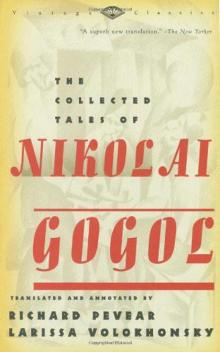 The Collected Tales of Nikolai Gogol
The Collected Tales of Nikolai Gogol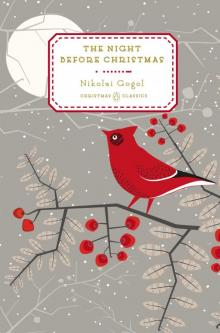 The Night Before Christmas
The Night Before Christmas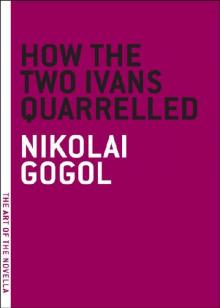 How the Two Ivans Quarrelled
How the Two Ivans Quarrelled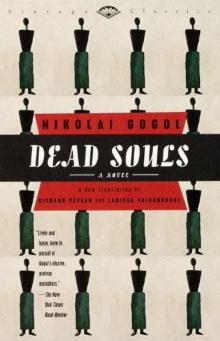 Dead Souls
Dead Souls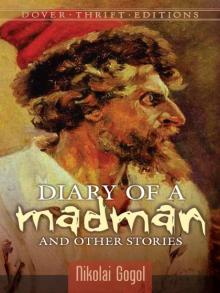 Diary of a Madman and Other Stories
Diary of a Madman and Other Stories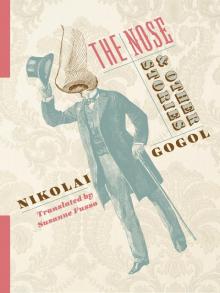 The Nose and Other Stories
The Nose and Other Stories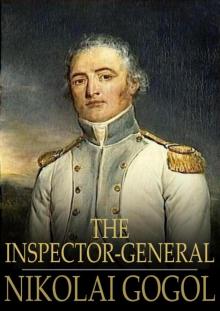 The Inspector-General
The Inspector-General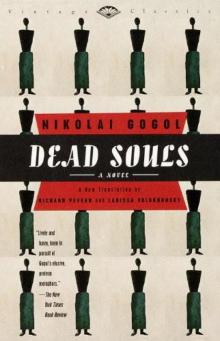 Dead Souls: A Novel
Dead Souls: A Novel